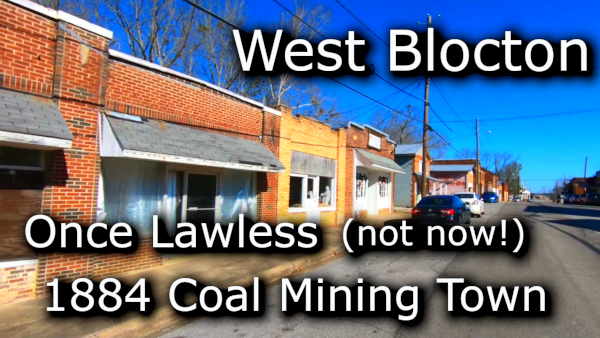
In my latest adventure I visit West Blocton, Alabama, once described as a lawless coal mining town. I’m calling this one, West Blocton – Once Described as Lawless Coal Mining Town! Urban Hiking Ep-37.
Yes, all the usual suspects are in this one as well – barns, beautiful country landscapes, what appears to be some abandoned, uninhabited or vacant homes – but as usual you get to decide what you think on those!
Here’s what the Encyclopedia of Alabama’s website has to say about West Blocton: West Blocton sprang up in the late nineteenth century near mines owned by the Cahaba Coal Company. It was the fastest-growing town in the coal-mining district and had the reputation for lawlessness. It first was dubbed Suttletown after an early store owner in the area, then Smith, and finally West Blocton to differentiate it from the nearby town of Blocton, which no longer exists. Both towns supposedly derived their names from the huge intact blocks of coal, some weighing as much as a ton, that were removed from the mine. West Blocton was incorporated in 1901.
Several businesses quickly opened, including in 1901 a dispensary that gave half of its profits to the town. Other businesses included dry goods stores, a stable a photographer, and so on. A rudimentary water system was available by 1902, and the first public school opened in 1903. The first post office opened in 1904. The town was notable for its large Jewish community, which had largely disappeared by the 1920s.
In 1903, West Blocton was hit by a tornado, then by a flood in 1916, and then by a major fire in 1927. The town rebuilt each time. In 1935, the town’s high school was declared structurally unsound and a new one was built.
The Historical Marker Database site notes what’s on the historical marker at the beginning of the town – West Blocton began as a business and residential community adjoining the Cahaba Coal Mining Company’s town of Blocton in 1883-84. West Blocton incorporated in 1901. Eugene D. Reynolds was the first mayor, 1901-1904, followed by Dr. L.E. Peacock, 1904-1906. A son of Italian Immigrants, Frank T. Ferrire, has been the longest serving mayor, 1965-1984. West Blocton was the commercial center of the southern Cahaba coal field serving the neighboring company towns and mining camps of Belle Ellen, Piper, Lucille, Gurnee, Coleanor, Garnsey, Galloway, Marvel, Moffatt, Masena, Braehead, Red Eagle and Hargrove. Economic opportunity attracted a diverse population. An Italian Catholic Cemetery lies just east of town and the League of Brothers Synagogue was built on Main Street in 1905. Bibb County’s first bank, the Blocton Savings Bank was established in 1892. By 1910, West Blocton boasted of 55 businesses including a newspaper, bottling works, hotels, general stores, lawyers, doctors, photographers, shoemaker, tailor and dentist offices. West Blocton is now the home of the Cahaba Lily Festival.
